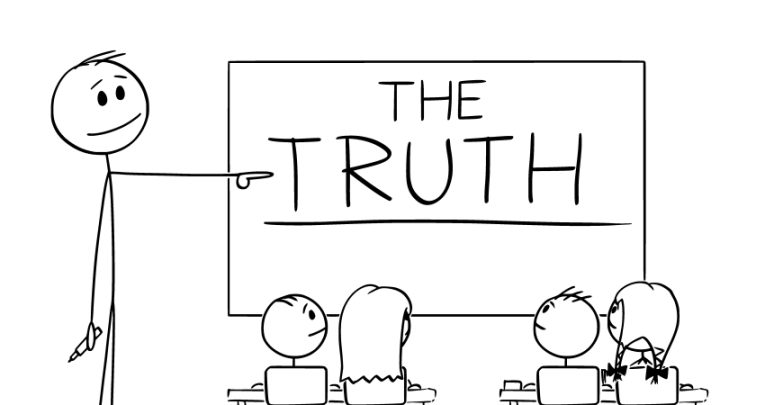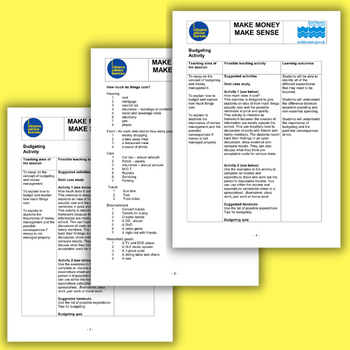Teaching the truth – Why facts and honesty aren’t always appreciated in the classroom

One might think that maintaining fidelity to the truth and facts is an inalienable part of teaching that trumps all else – but alas, things aren’t always so straightforward…

- by John Lawson
- Former teacher, governor, author & owner of tutoring service Visit website

As a high school teacher of global ethics for 20+ years, I became used to regularly pulling off something of a high wire act.
I always knew that my next unscripted utterance had the potential to, at best, enlighten my audience or, at worst, get me fired.
When the principal first accepted my proposal for a new ethics course, she warned me that parents would frequently complain more forcefully about ethics classes than those for any other subject – even politics. “Your job,” she stressed, “is to ensure that more compliments than complaints about you are ringing in my ears.”
At first, I naïvely assumed that this would be more likely if I maintained a strict fidelity to honest facts. It soon turned out that being truthful did indeed serve me well in my relations with students – but that when dealing with parents and administrators, greater circumspection would often be required.
The grey zone
I used to welcome my new students by giving them a copy of a laminated sign I had displayed on my classroom wall, which read as follows:
WELCOME TO THE GREY ZONE
Warning – the atmosphere of this room is not
conducive to closed, prejudiced, or simple minds; open-and-shut cases; black-and-white issues; paper tiger hunting; straw man savaging; self-aggrandising grandstanding; no-brainers; sound bites; or mere opinions.
In this classroom, we separate ‘wise guys’ from ‘wise-guys’. You are entitled to your own opinions, but not your own facts. We will seek the truth and facts whenever possible, guided by love and mutual respect for everyone.
The grey zone is where grey matter wrestles with the grey areas of contemporary moral issues. I can still recall my Catholic students becoming visibly puzzled when I told them that my first loyalty was not to them, their parents, the principal, the Pope, holy texts, or even Jesus Christ (pausing briefly for effect) – it was to truth and honesty.
When we choose to put ego aside and seek the truth, it becomes impossible to lose arguments. Codology, pontification and truth decay, on the other hand, are reliably and painfully debilitating.
Teachers should seek to promote ideas that benefit wider society, rather than those which only serve narrow interest groups. While we will never all be ‘the same’, we should at least recognise the importance of aspiring towards universal equality.
Despite this, however, if I’d dared to point out, for example, that turtles’ eggs are given greater protections than those afforded unborn humans, friends would have shunned me and my career would have taken a very different turn.
Virtue and values
Telling the truth can often provoke rage and accusations of so-called virtue signalling – ‘Tone it down, can’t you?!’ But when does one’s tone ‘become acceptable’? Should we keep modifying our views until they become bland and homogenised?
Looked at this way, it’s hard to see why anyone would attack any teacher who consistently advocates for life, love, and liberty over violence, hatred, and suppression. Truth and honesty aren’t controversial – so it follows that nobody should be disciplined for expressing demonstrable facts, right?
One racist parent at the school demanded my instant dismissal after I’d told a class that racism was ‘born of ignorance’, but I’d maintain that making moral judgments about others based on biological difference is ignorant. Then there was the time an archbishop chided me for declaring that since nobody chooses their sexual orientation, being gay cannot be intrinsically sinful or immoral.
Socrates suggested that virtue and values can’t be taught – but if we fail to properly value truth and honesty, then we’re merely making noises. What has always saddened me most is seeing the despair of impoverished teenagers who see education as a game of two sides – one in which their side is always playing uphill and into the wind.
And to some extent they’re right, given how geography so frequently determines destiny. Nor does it help that the very people best placed to tackle this are facing disadvantages of their own. How should I motivate aspiring teachers when supply work pays £100 a day? My plumber makes £400+ a day.
What price do we risk by telling teenagers the truth – the whole truth, and nothing but the truth – when our words and motives may well be taken down and used against us?
John Lawson (@johninpompano) is a former secondary teacher, now serving as a foundation governor and running a tutoring service, and author of the book The Successful (Less Stressful) Student (Outskirts Press, £11.95); for more information, visit prep4successnow.wordpress.com










